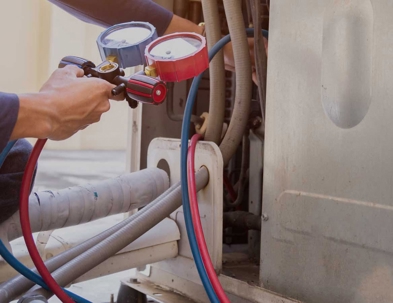Believe it or not, refrigerants in your AC system play a key role in your system. As a beginner, understanding how they work within your HVAC unit may be intimidating due to the science involved.
Learning about refrigerants can be easy, thanks to Fairway Heating and Cooling in Tampa Bay, Florida. To help you, our specialists have provided you with a quick guide breaking down what refrigerants are and how they operate within your system.
What Are AC Refrigerants?
AC refrigerants are fluids used in the refrigeration cycle of AC systems. They serve as heat transfer mediums that move heat away from a given space and replace it with cool air.

The Role Refrigerant Plays in Your AC System
Refrigerants are the key chemical in your HVAC system that makes your AC or heat pump work. They allow your system to reach a desired temperature.
To achieve cooling, condensers and evaporators connected to your thermostat act on the coils to compress or vaporize the liquid refrigerant within the coils.
The process begins when the refrigerant is compressed from a liquid to a low-pressure gas. The compressor pushes the gas molecules together, heating them as the pressure rises.
That pressurized gas is pushed through the condenser while condenser fans blow across the pipes to cool the gas. As it’s cooled, the pressure pulls the molecules tighter together, causing the refrigerant to return to a liquid.
Thereafter, the lower-pressure liquid encounters the evaporator. With the refrigerant pressure lower, it can reduce the temperature in your home. To provide cold air, fans in the evaporator blow over the pipes holding the liquid. As a result, the pressure changes again.
How it Works
Essentially, the refrigerant reacts by boiling based on an endothermic reaction, which means while it boils and evaporates into a gas, the chemical absorbs the surrounding thermal energy, allowing the temperature around it to drop.
The fans continue blowing, distributing the cooled air throughout your home. As more refrigerant pumps into the evaporator, warm air is drawn from your home and chilled through the endothermic reaction.
The hot gas is then released through the compressor. The compressor (housed within the outdoor condenser) acts as the heart of the refrigeration cycle, moving in a loop to create equilibrium within your system.
Types of Refrigerants
Refrigerants in your AC system are categorized based on their chemical composition.
The following are the main refrigerant types:
- Chlorofluorocarbons (CFCs)- known as Freon, contain chlorine and are dangerous because they deplete the world’s ozone layer.
- Hydryochloroflourocarbons (HCFCs)- although they contain less chlorine, they still can negatively impact the environment.
- Hydrofluorocarbons (HFCs)- also known as Puron. They have no chlorine and are not harmful.
In recent years, CFCs and HCFCs have been phased out to reduce environmental damage. Contact your local HVAC specialist if you are concerned about which refrigerant type you may have. Since each system is only compatible with a specific type of refrigerant, consult a professional before attempting to change it.
Reach Out To Fairway Heating & Cooling To Check your System’s Refrigerant
With better insight regarding refrigerant in your AC system, you’re one step ahead when your unit begins to malfunction. For assistance with your HVAC system in Tampa Bay, you can rely on Fairway Heating and Cooling! Our highly trained experts will provide quick and reliable service for your AC. At Fairway, your satisfaction is our top priority.
To find out more about how we can help you, visit our Services page. If you want to speak to a customer service agent or schedule an estimate, contact us today!
The post The Role of Refrigerant in Your AC System appeared first on Fairway Heating and Cooling, LLC.

